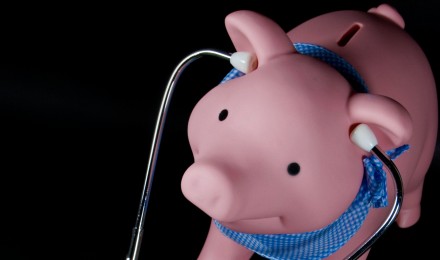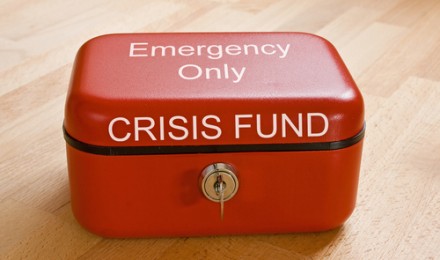One of the key steps to being financially fit is to maintain an emergency and opportunity fund. You can never tell when a financial emergency will hit, or a great opportunity for investing will come along. The only way to be truly prepared for these occurrences is to have a healthy backup savings plan.
It is generally agreed upon that 6 months worth of living expenses is the minimum for an emergency fund. This amount should provide adequate savings in the event that you were to lose your job. After being laid off, or fired, the emergency fund will be enough to cover all the bills allowing you to seek employment and not worry about picking up odd jobs in order to make ends meet. Using a budget sheet, the goal of what the emergency fund should be built up to can be determined. Keep in mind, though, that 6 months is the minimum that should be maintained, many financial professionals suggest up to two years worth of income needs. The emergency fund is also not just for the event of a lost job, large unexpected medical bills, a new furnace for the house, or a new engine for the car are also emergencies, and warrant dipping into the fund.
Nearly everyone has heard of maintaining an emergency fund, not as many people think to maintain an opportunity fund. A certain amount of money should be set aside in case a great opportunity comes along. Sometimes there is an opportunity to start a new business, or become an initial investor in a business. This opportunity would just pass right by if there was no fund set up. Perhaps a great deal on a new vehicle presents itself. With a good savings account, a person can pick up this great deal without having to go into debt. If the time is needed to find a lender and be approved for a loan, then the opportunity could pass right by. There are a lot of different scenarios where having extra cash on hand would be a good thing, maintaining an opportunity fund will help with just that.
It is not a matter of “if” an emergency or opportunity will come along; it is a matter of “when” it will come along. While being unprepared can cause disappointment when an opportunity is missed, it can have much more devastating affects if an emergency occurs and there is no backup source of funding. Rather than take that chance, it is better to be prepared. There is the problem, however, of the desire to have a backup savings plan, but not have enough spare money to do so. Even after working out the budget sheet, there is very little “wiggle” room in many people’s lives to save more money. Our next article we will look at how to free up money from the budget. By cutting some unnecessary expenses, and negotiating others, money can be found to fund various savings plans.
One of the key steps to being financially fit is to maintain an emergency and opportunity fund. You can never tell when a financial emergency will hit, or a great opportunity for investing will come along. The only way to be truly prepared for these occurrences is to have a healthy backup savings plan.
It is generally agreed upon that 6 months worth of living expenses is the minimum for an emergency fund. This amount should provide adequate savings in the event that you were to lose your job. After being laid off, or fired, the emergency fund will be enough to cover all the bills allowing you to seek employment and not worry about picking up odd jobs in order to make ends meet. Using a budget sheet, the goal of what the emergency fund should be built up to can be determined. Keep in mind, though, that 6 months is the minimum that should be maintained, many financial professionals suggest up to two years worth of income needs. The emergency fund is also not just for the event of a lost job, large unexpected medical bills, a new furnace for the house, or a new engine for the car are also emergencies, and warrant dipping into the fund.
Nearly everyone has heard of maintaining an emergency fund, not as many people think to maintain an opportunity fund. A certain amount of money should be set aside in case a great opportunity comes along. Sometimes there is an opportunity to start a new business, or become an initial investor in a business. This opportunity would just pass right by if there was no fund set up. Perhaps a great deal on a new vehicle presents itself. With a good savings account, a person can pick up this great deal without having to go into debt. If the time is needed to find a lender and be approved for a loan, then the opportunity could pass right by. There are a lot of different scenarios where having extra cash on hand would be a good thing, maintaining an opportunity fund will help with just that.
It is not a matter of “if” an emergency or opportunity will come along; it is a matter of “when” it will come along. While being unprepared can cause disappointment when an opportunity is missed, it can have much more devastating affects if an emergency occurs and there is no backup source of funding. Rather than take that chance, it is better to be prepared. There is the problem, however, of the desire to have a backup savings plan, but not have enough spare money to do so. Even after working out the budget sheet, there is very little “wiggle” room in many people’s lives to save more money. Our next article we will look at how to free up money from the budget. By cutting some unnecessary expenses, and negotiating others, money can be found to fund various savings plans.







